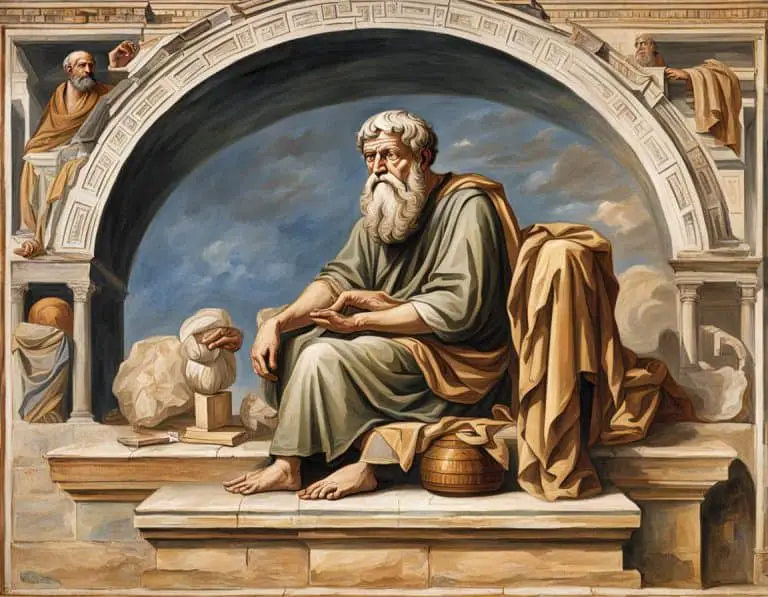Mentorship by Cratylus
Under the guidance of his mentor Cratylus, Plato was exposed to a profound understanding of language and its relationship to reality. Cratylus’ teachings emphasized the idea that words are not arbitrary but inherently connected to the essence of things. This notion deeply influenced Plato’s later philosophical investigations, leading him to explore the nature of truth and knowledge through the lens of language.
Cratylus instilled in Plato a sense of wonder and curiosity about the underlying structures of the world, motivating him to delve into metaphysical inquiries that would shape the foundation of Western philosophy. Through their discussions on the significance of names and the nature of change, Plato’s mentorship with Cratylus laid the groundwork for his own theories on the Forms and the eternal nature of reality.
Cratylean Influence on Plato’s Thought
The influence of Cratylus on Plato’s philosophical thought cannot be overstated. Under the guidance of this renowned philosopher, Plato delved into the realms of language, semantics, and metaphysics, concepts that would later form the cornerstone of his own philosophical inquiries. Cratylus’s emphasis on the inherent relationship between language and reality deeply resonated with Plato, shaping his belief in the existence of universal truths that transcend mere appearances.
Plato’s engagement with Cratylean teachings not only refined his understanding of the nature of knowledge but also fostered a critical approach to the concepts of being and becoming. By exploring the intricate connections between words, ideas, and the material world, Plato was able to develop his theory of Forms, positing a higher reality of unchanging and perfect entities that underlie the fleeting world of the senses. This intellectual journey, influenced by Cratylus’s profound insights, laid the groundwork for Plato’s enduring legacy as one of the greatest philosophers in history.
Impact of Sophists
The Sophists were a group of itinerant teachers in ancient Greece who greatly influenced Plato’s philosophical development. They were known for their skeptical attitudes towards absolute truth and their emphasis on the importance of rhetoric and persuasion. Plato engaged with several Sophists during his youth, most notably Protagoras and Gorgias. Despite his initial admiration for their rhetorical skills, Plato ultimately became disillusioned with the relativistic views of the Sophists. He believed that their teachings lacked a solid foundation in objective truth and moral principles, leading him to develop his own philosophical system based on universal truths and ideals.
Plato’s encounters with the Sophists played a significant role in shaping his philosophical outlook. While the Sophists focused on the practical aspects of rhetoric and persuasion, Plato delved deeper into metaphysical questions about the nature of reality, knowledge, and ethics. The contrast between the Sophists’ relativism and Plato’s pursuit of eternal truths laid the foundation for his later works, such as “The Republic” and “The Symposium.” By engaging critically with the Sophists’ ideas, Plato was able to clarify his own philosophical positions and establish a lasting legacy as one of the most influential thinkers in Western philosophy.
Contrasting Philosophical Views
When examining the contrasting philosophical views between Plato and the Sophists, a notable disparity emerges. While the Sophists focused on rhetoric and the art of persuasion to achieve personal success and power, Plato, on the other hand, sought to uncover universal truths through dialectic reasoning. The Sophists prioritized relative truth, believing that what is true for one person may not be true for another, highlighting a subjective approach to knowledge. Conversely, Plato believed in the existence of absolute truths, advocating for the pursuit of objective knowledge that transcends individual perspectives.
Plato and the Sophists also diverged in their perceptions of virtue and ethics. The Sophists upheld moral relativism, asserting that ethical standards were contingent upon societal norms and personal beliefs. In contrast, Plato posited the existence of objective morality, rooted in the concept of the Forms. For Plato, virtues such as justice, courage, and wisdom were not subjective constructs but ideal abstractions that existed independently of human perception, illustrating a fundamental distinction in their ethical frameworks.
The Academy
Established in Athens around 387 BC, The Academy was founded by Plato as a center for philosophical and scientific studies. It served as a sanctuary for scholars and students alike, fostering a community dedicated to the pursuit of knowledge and truth. The Academy’s curriculum covered a wide range of subjects, including mathematics, philosophy, and rhetoric, attracting intellectuals from all corners of the ancient world.
Under Plato’s guidance, The Academy became a bastion of intellectual thought and philosophical inquiry. Scholars engaged in lively debates and discussions, pushing the boundaries of what was known and challenging conventional wisdom. The environment cultivated by Plato encouraged critical thinking and a spirit of curiosity, laying the groundwork for the institution to become the world’s first known university.
Establishment of the First University
The establishment of the Academy by Plato marked a significant milestone in the history of education. With its founding around 387 BC in Athens, the Academy became the first institution in the world that can be likened to a university. Its primary focus was on the pursuit of knowledge through philosophical dialogue and intellectual inquiry. Plato envisioned a place where scholars and students could come together to engage in discussions, debate ideas, and deepen their understanding of the world.
The Academy was not just a place of learning but also a community of thinkers dedicated to exploring the fundamental questions of existence and morality. Through a structured curriculum and a culture of critical thinking, Plato aimed to cultivate well-rounded individuals who could contribute positively to society. The Academy’s impact on Western philosophy and education cannot be overstated, as it laid the foundation for future institutions of higher learning and shaped the intellectual landscape for centuries to come.
Related Links
How to understand Plato’s education and mentorship?
What Influenced Plato’s Travel and Exposure to Different Philosophies
